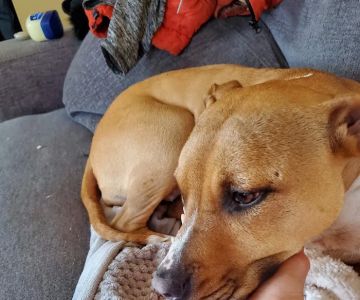How to Treat Dog Kennel Cough: A Complete Guide
javascript复制As a pet owner, nothing is more concerning than when your dog falls ill. One of the most common ailments dogs face is kennel cough, which can be alarming, especially if you’re not sure how to treat it. If your dog is coughing persistently after a recent stay at a kennel, dog park, or after exposure to other dogs, they may have contracted this highly contagious respiratory illness. Fortunately, kennel cough can usually be treated effectively with a combination of veterinary care and home remedies. In this guide, I’ll walk you through how to treat dog kennel cough, what symptoms to look for, and how to ensure your dog’s recovery.
1. What is Kennel Cough in Dogs?
Dog kennel cough, also known as canine infectious tracheobronchitis, is a highly contagious respiratory disease that is commonly spread in places where dogs gather in groups, such as kennels, dog parks, and grooming salons. It is caused by a variety of pathogens, including the Bordetella bronchiseptica bacteria, viruses, and other microorganisms. These pathogens irritate the dog’s trachea and bronchial tubes, causing inflammation and the characteristic dry, hacking cough.
The good news is that kennel cough is typically mild and self-limiting in healthy dogs. However, it can sometimes develop into more severe conditions, particularly in puppies, older dogs, or those with weakened immune systems. Early detection and treatment can prevent the condition from worsening.
2. Symptoms of Kennel Cough
It’s important to recognize the symptoms of kennel cough early so you can begin treatment and minimize the risk of complications. Here are the most common symptoms:
- Persistent Cough: A dry, hacking cough is the hallmark symptom of kennel cough. The coughing may sound like a honking noise.
- Gagging or Retching: Some dogs with kennel cough may gag or vomit after coughing.
- Watery Eyes: Mild eye discharge or watery eyes can accompany the condition.
- Loss of Appetite: In more severe cases, dogs may lose their appetite and become lethargic.
- Clear Nasal Discharge: A runny nose is another common sign of kennel cough.
If your dog exhibits these symptoms, it’s a good idea to consult a veterinarian to confirm the diagnosis and discuss the best treatment plan.
3. How to Treat Kennel Cough at Home
In many cases, kennel cough can be treated effectively at home with supportive care. Here are a few steps you can take to help your dog recover:
- Rest: Just like humans, dogs need rest to recover from illnesses. Keep your dog in a quiet, calm environment away from other dogs, and avoid vigorous exercise.
- Hydration: Make sure your dog has access to fresh water at all times. Staying hydrated is essential for recovery and helps to soothe the throat.
- Humidifier: Using a humidifier in your home can help loosen mucus and ease your dog’s coughing. Alternatively, you can sit with your dog in a bathroom filled with steam from a hot shower for short periods.
- Honey and Warm Water: Some pet owners use honey mixed with warm water to help soothe their dog’s throat. Honey has natural antibacterial properties and can provide relief from the irritation caused by coughing.
4. Veterinary Treatment for Kennel Cough
While home remedies can be effective for mild cases of kennel cough, it’s important to seek veterinary care if your dog’s symptoms are severe, or if they develop a fever or other complications. Your veterinarian may recommend the following treatments:
- Antibiotics: If a bacterial infection is suspected, your veterinarian may prescribe antibiotics like doxycycline to treat the underlying infection.
- Cough Suppressants: Cough suppressants may be prescribed to reduce the severity of coughing and make your dog more comfortable. However, these are typically used cautiously and only when necessary, as coughing helps clear mucus from the respiratory system.
- Anti-inflammatory Medications: Non-steroidal anti-inflammatory drugs (NSAIDs) may be prescribed to reduce inflammation and alleviate discomfort.
- Fluids and Electrolytes: In cases where your dog is dehydrated or not eating well, your vet may administer fluids intravenously or subcutaneously to maintain hydration.
5. Preventing Kennel Cough
Prevention is always better than treatment, especially when it comes to highly contagious illnesses like kennel cough. Here are some ways to reduce the risk of your dog contracting kennel cough:
- Vaccination: Vaccines for kennel cough are available and can help reduce the severity of the illness. The Bordetella vaccine is the most commonly used vaccine for preventing kennel cough, and it is recommended for dogs who frequently interact with other dogs or stay in boarding facilities.
- Avoid Exposure: If possible, avoid taking your dog to places with high dog traffic, such as dog parks or boarding kennels, especially if there’s an outbreak of kennel cough in your area.
- Good Hygiene: Ensure that your dog’s living area is clean and free of irritants, and disinfect any areas your dog frequents to reduce the spread of germs.
6. When to See a Veterinarian
While kennel cough can often be treated at home, there are certain situations where a visit to the veterinarian is essential. If your dog’s symptoms persist for more than a week, worsen, or if they develop a fever, lethargy, or a decrease in appetite, it’s important to consult your vet. Additionally, puppies, older dogs, and dogs with compromised immune systems are more at risk for complications and should be monitored closely.
Early intervention can help prevent the condition from worsening and ensure your dog’s quick recovery. Your veterinarian can provide the best course of action and ensure that your dog receives the appropriate treatment.
Conclusion
Treating kennel cough in dogs involves a combination of rest, hydration, and veterinary care. With the right treatment, most dogs recover fully within a couple of weeks. By being proactive with home remedies and seeking veterinary treatment when necessary, you can ensure that your dog gets back to their happy, healthy self in no time.











